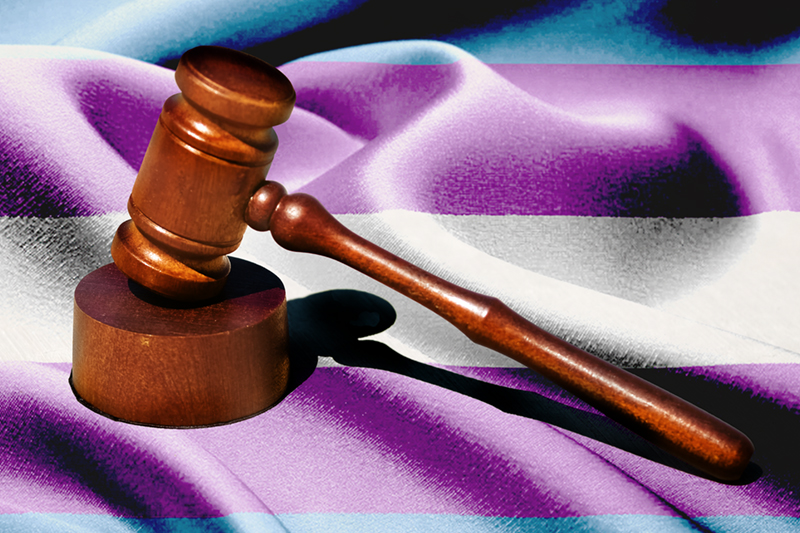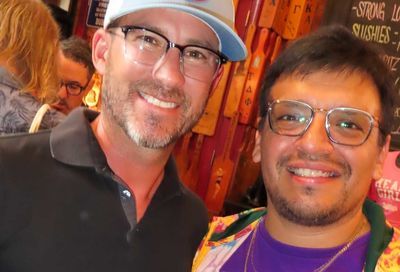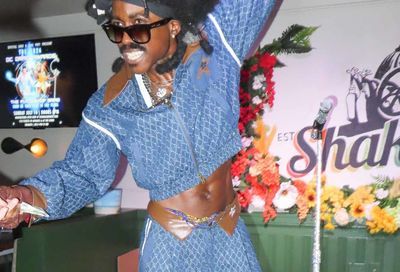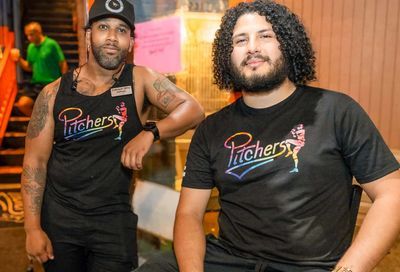LGBTQ students are protesting bullying and harassment with the “Day of Silence”
Annual event reclaims the silencing of LGBTQ students that can occur in schools
By John Riley on April 23, 2021 @JRileyMW

Each year in April, GLSEN, the nation’s leading organization on LGBTQ issues in K-12 education, hosts the annual Day of Silence, a student-led protest to call attention to the bullying and harassment of LGBTQ students.
Started by two college students at the University of Virginia in 1996, the Day of Silence, this year on April 23, spreads awareness of the harmful effects of LGBTQ erasure by taking a day-long vow of silence.
Many school Gender and Sexuality Alliance clubs (GSAs) encourage students to participate, and some students will even create signs or buttons explaining why they’ve chosen to remain silent.
“There’s data showing that four in five LGBTQ students don’t see positive LGBTQ representation in their curriculum,” notes a.t. furuya, the senior youth programs manager at GLSEN. “Nearly 9 in 10 students have experienced harassment or assault, and almost a third missed school because they feel unsafe or uncomfortable. So we need to start the conversations around this.”
This year’s Day of Silence is taking place virtually for many students due to the COVID-19 pandemic and schools opting to have students work from home rather than attend classes in person.
To help with this, GLSEN is offering Zoom backgrounds that students can utilize while signed into virtual classes and is holding a national moment of silence at 3 p.m. EST for students who can’t be silent.
The day will end with a “Breaking the Silence” virtual rally at 7 p.m., featuring various speakers, including celebrities like Zachary Quinto, JoJo Siwa, and Alok Vaid-Menon.
For those in person, GLSEN offers protective COVID-19 masks advertising the day of silence and printable cards they can hand out explaining their decision to participate.
This year’s theme, “My Silence, My Story,” seeks to highlight individual stories and struggles, which feel particularly relevant at a time when LGBTQ students, particularly transgender individuals, find themselves under attack by bills being pushed in close to 30 state legislatures.
“This Day of Silence is an especially critical one as anti-LGBTQ+ lawmakers across the nation continue to ignore youth advocates and push harmful bans that constituents and experts alike condemn,” GLSEN Interim Executive Director Melanie Willingham-Jaggers said in a statement. “These bills seek to strip youth of their rights and pressure them into silence, so it’s inspiring to see how students have turned the idea of silence on its head by coming together to build power and change hearts and minds in their communities.”
Students who have participated in the Day of Silence in past years have praised the intention behind the event and say they’ve largely found support, both nationally by GLSEN and locally, by individual administrators.
“Day of Silence has always been important to me, but after a year of the pandemic it’s especially meaningful to have the chance to connect and share my experiences with others,” Nic Oke, a high school student at Towson High School in Baltimore County, and a member of GLSEN’s National Student Council, said in a statement.
“This is such a difficult time for LGBTQ+ youth, but we’ll keep fighting for change, together. No matter where students are or what their school setup looks like at this point in the pandemic, they and their friends, families and teachers can join Day of Silence’s events and learn from the resources.”
See also: West Virginia bill would prohibit displays of sexuality in schools
Suraj Singareddy, another member of GLSEN’s National Student Council from Northview High School in Georgia, says the Day of Silence allows LGBTQ students to reclaim the silencing and erasure of LGBTQ students that can occur in a school environment for themselves, in order to send an important message to other students about the negative impacts of exclusion.
“I participated in the Day of Silence last year, and my school’s GSA got pins from GLSEN basically saying why we were silent and what we were doing, and pretty much all the teachers were pretty accepting. But I’m lucky to be going to a school where our faculty is pretty accepting,” Singareddy notes.
Roxana Solis, a student at Falls Church High School who is the president and treasurer of the school’s Gender and Sexuality Alliance club, says she’s using the day to raise awareness of, and promote participation in, GLSEN’s National School Climate Survey, which examines, in part, how LGBTQ students are treated, the problems they face, and whether they’ve experienced any number of self-harming behaviors because of their treatment in school.
Solis says, through her role as a leader in the GSA, she has educated faculty and fellow students, both in her school and other institutions, about the significance of the Day of Silence and its overall message.
“For the most part, a lot of students are really supportive and they understand like what’s going on, because I usually hand out like little signs or papers saying it’s the Day of Silence and explaining what it is,” she says. “I think something important to know that it’s not exclusively reserved for people in the LGBTQ community, but people outside the community. Our supporters can also be attacked sometimes.
“It’s important for people to know that being silent for one day, or even one moment of silence, means a huge deal for all of us, because it shows support and sends a message that we are not alone,” Solis says.
For more information about the Day of Silence, visit www.glsen.org/day-of-silence.
Read more:
HUD withdraws Trump-era revisions restricting shelter access for transgender individuals
Kansas Gov. Laura Kelly vetoes bill seeking to bar transgender athletes from sports
Federal Judge: “There Are Two Sexes: Male And Female”
Judge Danny Reeves ruled that the U.S. Department of Education, which issued Title IX guidance for schools, overstepped its authority.
By John Riley on June 18, 2024 @JRileyMW
A federal judge issued a ruling blocking the Biden administration's guidance for schools, under which LGBTQ students discriminated against because of their sexual orientation or gender identity can file complaints of sex discrimination.
U.S. District Court Judge Danny Reeves opened his 93-page opinion with the declaration, "There are two sexes: male and female."
The Biden administration's Title IX guidance expands the definition of "sex" beyond just a person's biological anatomy.
The guidance is meant to protect LGBTQ students from incidents of unequal treatment, harassment, or sex stereotyping, which are usually based, in part, on a person's assigned sex at birth and how they present, in terms of gender norms, to the outside world.
Trans Woman Wins $35K After Being Denied Leg Waxing Service
The Human Rights Tribunal of Ontario found Mad Wax Salon discriminated against the woman based on her gender identity.
By John Riley on July 2, 2024 @JRileyMW
The Human Rights Tribunal of Ontario awarded an Indigenous transgender woman $35,000 in legal damages after a waxing salon denied her service.
In addition to the damages, an undisclosed amount in interest will be paid, caculated from the start of the case on March 17, 2018. More interest may be incurred if the owner of the salon fails to pay within 30 days.
The decision comes after a six-year legal battle between the woman, A.B., and Mad Wax Salon in Windsor, Ontario. A.B. called the salon to book an appointment for a leg wax but was refused because the only available staff member, a Muslim woman, refused to wax people assigned male at birth, citing religious beliefs.
Grindr Fined $6 Million for Sharing “Sensitive” User Data
A Norwegian court upheld a fine imposed on Grindr for allegedly sharing users' "sensitive" information with third parties.
By John Riley on July 11, 2024 @JRileyMW
The popular gay dating app Grindr has been fined 65 million Norwegian Krone -- or just over $6 million in U.S. dollars -- for allegedly sharing "sensitive" user data with commercial companies.
On July 1, the Oslo District Court upheld a fine imposed on the company by the Norwegian Data Protection Authority, a federal regulatory body, for breaching the General Data Protection Regulation (GDPR), a European Union law that aims to protect personal data and fundamental rights in digital spaces.
The case dates back to 2020 when the Norwegian Consumer Council filed a complaint as part of a report alleging that Grindr was sharing personal data with numerous commercial third parties.
Support Metro Weekly’s Journalism
These are challenging times for news organizations. And yet it’s crucial we stay active and provide vital resources and information to both our local readers and the world. So won’t you please take a moment and consider supporting Metro Weekly with a membership? For as little as $5 a month, you can help ensure Metro Weekly magazine and MetroWeekly.com remain free, viable resources as we provide the best, most diverse, culturally-resonant LGBTQ coverage in both the D.C. region and around the world. Memberships come with exclusive perks and discounts, your own personal digital delivery of each week’s magazine (and an archive), access to our Member's Lounge when it launches this fall, and exclusive members-only items like Metro Weekly Membership Mugs and Tote Bags! Check out all our membership levels here and please join us today!
The Magazine
-
Most Popular
 Matt Walsh Blasts Amber Rose's Appearance at the RNC
Matt Walsh Blasts Amber Rose's Appearance at the RNC  Kamala Harris to Appear on "RuPaul's Drag Race All Stars" Finale
Kamala Harris to Appear on "RuPaul's Drag Race All Stars" Finale  Poll: Who Should Kamala Harris Pick as Vice President?
Poll: Who Should Kamala Harris Pick as Vice President?  J.D. Vance Blocked 30 Pro-LGBTQ Ambassadors
J.D. Vance Blocked 30 Pro-LGBTQ Ambassadors  Buttigieg Smacks Down Vance for "Childless Left" Comment
Buttigieg Smacks Down Vance for "Childless Left" Comment  Pete Buttigieg's Blistering Takedown of J.D. Vance
Pete Buttigieg's Blistering Takedown of J.D. Vance  Gay Porn Star Austin Wolf Arrested on Child Pornography Charges
Gay Porn Star Austin Wolf Arrested on Child Pornography Charges  Gay Porn Star Forced by Russian Police to Entrap Gay Men
Gay Porn Star Forced by Russian Police to Entrap Gay Men  Losing Its Mind Over Kamala Harris, MAGA Stoops to Ugly Name-Calling
Losing Its Mind Over Kamala Harris, MAGA Stoops to Ugly Name-Calling  Elon Musk Says "Woke Mind Virus" "Killed" His Trans Child
Elon Musk Says "Woke Mind Virus" "Killed" His Trans Child
 Poll: Who Should Kamala Harris Pick as Vice President?
Poll: Who Should Kamala Harris Pick as Vice President?  Kamala Harris to Appear on "RuPaul's Drag Race All Stars" Finale
Kamala Harris to Appear on "RuPaul's Drag Race All Stars" Finale  This Week's Advertisers: Issue of July 25, 2024
This Week's Advertisers: Issue of July 25, 2024  J.D. Vance Blocked 30 Pro-LGBTQ Ambassadors
J.D. Vance Blocked 30 Pro-LGBTQ Ambassadors  Buttigieg Smacks Down Vance for "Childless Left" Comment
Buttigieg Smacks Down Vance for "Childless Left" Comment  Elon Musk Says "Woke Mind Virus" "Killed" His Trans Child
Elon Musk Says "Woke Mind Virus" "Killed" His Trans Child  San Francisco's Legendary Gay Club Oasis Robbed at Gunpoint
San Francisco's Legendary Gay Club Oasis Robbed at Gunpoint  D.C. High School Ordered to Recognize Anti-Gay Group
D.C. High School Ordered to Recognize Anti-Gay Group  Vineyard Voyages: Driving Through Virginia's Wine Country
Vineyard Voyages: Driving Through Virginia's Wine Country  Losing Its Mind Over Kamala Harris, MAGA Stoops to Ugly Name-Calling
Losing Its Mind Over Kamala Harris, MAGA Stoops to Ugly Name-Calling
Scene
Metro Weekly
Washington's LGBTQ Magazine
P.O. Box 11559
Washington, DC 20008 (202) 638-6830
About Us pageFollow Us:
· Facebook
· Twitter
· Flipboard
· YouTube
· Instagram
· RSS News | RSS SceneArchives
Copyright ©2024 Jansi LLC.












You must be logged in to post a comment.